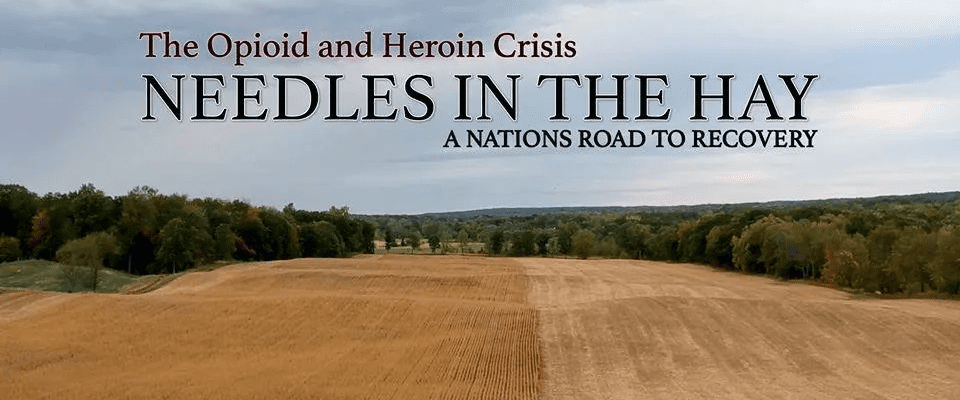Interview with “Needles in the Hay” Documentary Film Director Brett Meyer

Often, when we think of filmmakers, we picture the big-budget classics that rake in hundreds of millions of dollars. We think of Hollywood and the glitz and the glamor that accompanies it. We think movie stars, movie studio backlots, and academy awards.
But that’s just one very small side to filmmaking.
The other side of filmmaking is packed with storytellers who gather as much funding as they can, use the best equipment they can find, and work for years on end to tell true stories that matter.
It’s where most films are made, littered with important stories that don’t usually get the star-studded treatment.
Introducing Brett Meyer, Documentary Director
One example of this type of content comes from filmmaker and fellow addict, Brett Meyer, and his film, Needles in the Hay.
The film, still in post-production, personally details the opioid epidemic and its wake that led to a tsunami of first-time heroin users.
Watch the trailer for the film:
NEEDLES IN THE HAY (Official Trailer) 2022 from Brett Meyer on Vimeo.
AddictionHelp.com Founder Chris Carberg sat down the Brett to discuss the project, what led to its creation, and what’s next as he works to finish the film.
Chris Carberg: What drew you to making a film about the opioid epidemic?
Brett Meyer: I could personally relate to the project. I lived in LA for 20 years and my addiction to pills, coke, and alcohol took place there. Later when I got clean, I was injured and had shoulder surgery. I was unemployed for about three months because I couldn’t work in my profession of camera operating. I visited home (Michigan) often to see family and friends. Someone told me a lot of people were dying of opioids and heroin where we lived in the Midwest. Now I’m from a small town and I was floored by this.
I grew up around little towns and it was very odd to think opioids and heroin were so big here. I only knew LA and my own private life of addiction. That being said, I ended up seeing if a few heads would be interested in doing interviews so I could learn more about a topic I knew so much about personally, but not the lives of others suffering from the same thing back home. So one of the times I was traveling back and forth from LA to Michigan to do interviews and see friends, I asked a friend who was a cop in our small town if she knew anyone that may have a story to tell about the opioid crisis. This was in 2017.
Well, I didn’t know she was going to go on social media and say “I have a friend who is a filmmaker looking to get some interviews regarding the opioid epidemic and personal stories of people in recovery, using, families affected, etc”. She posted on FB while I was at a layover in the Windy City.
When I landed in Detroit I had 28 messages from people all over the Midwest wanting to talk on the subject. It was crazy. Then I knew I was going to really invest in this project.
At first, it was 1 or two interviews of curiosity that snowballed into a world in which I immersed myself.
How can the public be more supportive of activists’ efforts to save lives?
Brett Meyer: I think, like anything that needs change, it has been talked about loudly. The stigma of drug addicts needs to go away and be replaced with the fact that most people are being prescribed pain medication from a doctor for an injury and becoming addicted. Then the doctor cuts them off with no further assistance. These are your neighbors, family, and friends.
We need to become more aware of the people in our own lives struggling with addiction. It opens your eyes to an issue that is happening all around us even if we don’t see it. People need help.
Everyone knows someone that has or had addiction issues. We are all affected by it. How do you help someone when you know nothing about or even know it’s happening.
I didn’t. I was an addict, alcoholic, etc. before I found recovery in LA through meetings, etc.
What are you aiming to accomplish with NEEDLES IN THE HAY: The Opioid & Heroin Crisis?
Brett Meyer: The goal is to give the families, users, and those in recovery a voice. Period. The beauty of documentaries is you can hear and see personal stories and become invested personally in them. You will most likely never meet these people but it’s like you sat down with them and gave your full attention to what they have to say for an hour.
You can walk away with something that even if it didn’t touch your heart, made you think. So, the bigger audience we can gather the more change we can make. I found throughout the years of doing this project, people just want to be heard. We live in a fast pace world. When you have something so heavy weighing on you and what you’re going through, went through, or watched people telling their story helps make things a little better and brings hope to themselves and others.
One example, I had filmed a lot of active users over the years. Before I leave I say “When you get clean would you be willing to do a follow-up interview with me?”
Sometimes, months later, I get the call from someone that knew the person we interviewed and they let me know the person passed away.
Other times I get that call from the people I interviewed saying “Brett, it’s so and so I’m clean now. Would you like to do a follow-up interview with me?”.
As I respond, “WHAAAAATTTTT?!?!?! YES! WHERE ARE YOU I’LL GET THE CAMERA CREW AROUND AND HEAD OUT ASAP.”
Who are the victims’ activists who have most resonated with you?
Brett Meyer: This question is easy. The mothers. It breaks my heart to watch them go through so much. Imagine, holding up a sign and a face every day to make a change for someone that is no longer here. Over and over.
Some people go to a funeral and that’s one thing. But if you are reminded every day about what has torn apart your life and the one you loved and lost and you still go out the next day and try to help the next mother, that is something beyond me. They experience a different level of pain, peace, mission, and goal than I will ever know.
I really can’t even write anymore thinking about it. Sorry, it breaks my heart.
How can other creators support your efforts?
Brett Meyer: It’s funny because I’m at a crossroads with this project now. It’s taken 4 years to shoot. We have finished, the shooting, stories picked, all the footage organized ready for editing.
I’ve been doing this project for so long and it has drained me. My personal life has been affected. I’ve relapsed a number of times, almost dying. I broke the bank on it and have borrowed money from family to get the last of the footage and stories shot, which we did. I have finished my proposal describing everything that will be in the film as far as stories, etc.
I have finalized the finishing funds budget needed to get it done. The plan is to pitch it until the right people come along and wants to get on board and be part of the team. I’m not looking for people to throw funds at the project but build a team to make it our own.
I need a Producer I can work with to piece my vision together, a backer who believes in the project personally, organizations that can be tied to the completion of the film, and offer help to those who see the film and know someone in need. This is the only way to get this done.
You can shoot 4 years of footage alone but you need a team to go the last mile if you want to do it right.
What is the hardest thing about documenting this particular crisis (opioid epidemic)?
Brett Meyer: The mothers crying and the photos of the victims. Looking into their eyes in the pictures. Getting a call that someone didn’t make it and overdosed. Trying to stay clean myself is a big one. Doing a film like this by yourself, being so close to the subject, isn’t something you want to do.
It can be a really dark place. BUT the light is in the stories of people recovering, moms that I have become friends with who are doing so much out there and are able to be proud and happy for what they are doing for their loved ones is beautiful.
Are any other future projects coming up?
Brett Meyer: Yes. As I began to look for potential backers for “Needles in the Hay” I was asked to do a documentary on a former 1980’s NFL star later turned actor by the name of John Matuszak. The family has never told his story. They have been approached for years by different people in LA but refused. John struggled with addiction most of his life and later passed in 1989.
A lot of the press and media represented his rebellious side and made him out to be a troublemaker. It broke his mother’s heart so they refused all interviews. The family randomly saw the trailer of “Needles in the Hay” because the family knew one of my close friends who showed them. They asked to if I wanted to tell John’s life story.
I looked into him and read his autobiography and found this man to be an incredible, wonderful, beautiful, person who struggled at times like us all and I was sold. So we have just begun shooting interviews.
Interested in learning more about Brett and his film?
Centric Behavioral Health, our paid treatment center sponsor, is available 24/7:
Learn More About Centric or For Immediate Treatment Help, Call (888) 694-1249.
Find a Treatment Center Near You
- Treatment Center Locator
- Help You Can Trust
- Unbiased Support

